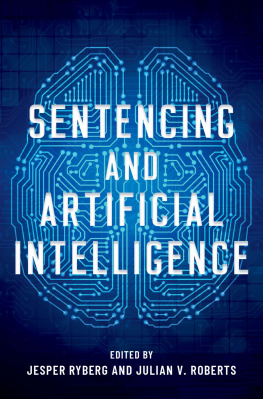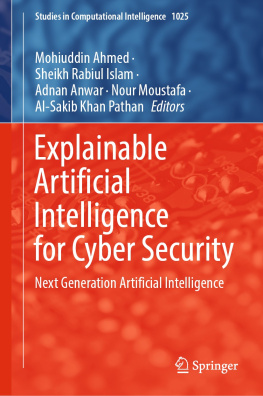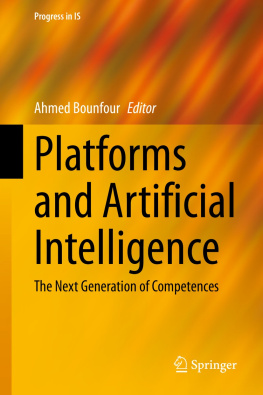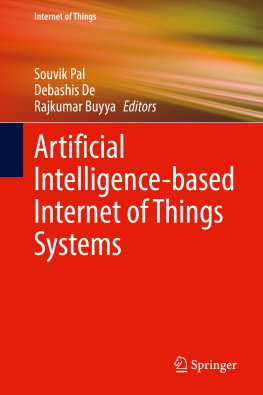Sentencing and Artificial Intelligence
Recent Titles in
Studies in Penal Theory and Philosophy
R.A. Duff, Michael Tonry, General Editors
Retributivism Has a PastHas It a Future?
Edited by Michael Tonry
Punishment, Participatory Democracy, and the Jury
Albert W. Dzur
Just Sentencing
Principles and Procedures for a Workable System
Richard S. Frase
Popular Punishment
On the Normative Significance of Public Opinion
Jesper Ryberg and Julian V. Roberts
Taming the Presumption of Innocence
Richard Lippke
Sentencing Multiple Crimes
Edited by Jesper Ryberg, Julian V. Roberts and Jan W. de Keijser
Playing Fair
Political Obligation and the Problems of Punishment
Richard Dagger
Hate, Politics, Law
Critical Perspectives on Combating Hate
Edited by Thomas Brudholm and Birgitte Schepelern Johansen
Criminal Law in the Age of the Administrative State
Vincent Chiao
Punishment and Citizenship
A Theory of Criminal Disenfranchisement
Milena Tripkovic
Beyond Punishment?
A Normative Account of Collateral Restrictions on Offenders
Zachary Hoskins
Neurointerventions, Crime, and Punishment
Ethical Considerations
Jesper Ryberg
The Metamorphosis of Criminal Justice
A Comparative Account
Jacqueline S. Hodgson
Guilty Acts, Guilty Minds
Stephen P. Garvey

Oxford University Press is a department of the University of Oxford. It furthers the Universitys objective of excellence in research, scholarship, and education by publishing worldwide. Oxford is a registered trade mark of Oxford University Press in the UK and certain other countries.
Published in the United States of America by Oxford University Press
198 Madison Avenue, New York, NY 10016, United States of America.
Oxford University Press 2022
All rights reserved. No part of this publication may be reproduced, stored in a retrieval system, or transmitted, in any form or by any means, without the prior permission in writing of Oxford University Press, or as expressly permitted by law, by license, or under terms agreed with the appropriate reproduction rights organization. Inquiries concerning reproduction outside the scope of the above should be sent to the Rights Department, Oxford University Press, at the address above.
You must not circulate this work in any other form and you must impose this same condition on any acquirer.
Library of Congress Control Number: 2021917982
ISBN 9780197539538
eISBN 9780197539552
DOI: 10.1093/oso/9780197539538.001.0001
Contents
Jesper Ryberg and Julian V. Roberts
Jesper Ryberg
Vincent Chiao
Jesper Ryberg and Thomas S. Petersen
Kasper Lippert-Rasmussen
Benjamin Davies and Thomas Douglas
Mirko Bagaric and Dan Hunter
Netanel Dagan and Shmuel Baron
John Zerilli
Richard L. Lippke
Mathis Schwarze and Julian V. Roberts
Sigrid van Wingerden and Mojca M. Plesniar
Frej Klem Thomsen
We are very grateful to the authors for contributing to this volume. In addition, we would like to thank Meredith Keffer, Macey Fairchild, and their colleagues at the Oxford University Press for assistance in publishing this book.
Jesper Ryberg and Julian V. Roberts
Copenhagen and Oxford
1 December, 2020
Mirko Bagaric is Dean of Law at Swinburne University.
Shmuel Baron is an S. J. D. candidate at the University of Toronto Faculty of Law.
Vincent Chiao is Associate Professor of Law at the University of Toronto.
Netanel Dagan is Lecturer of Law at the Institute of Criminology, Hebrew University of Jerusalem.
Benjamin Davies is a Research Fellow at the University of Oxford.
Thomas Douglas is Professor of Applied Philosophy at the University of Oxford.
Dan Hunter is Professor of Law and Executive Dean, Faculty of Law, Queensland University of Technology.
Kasper Lippert-Rasmussen is Professor of Political Theory at University of Aarhus.
Richard L. Lippke is Professor of Criminal Justice at Indiana University.
Thomas S. Petersen is Professor of Ethics at Roskilde University.
Mojca M. Plesniar is a Research Associate at the Institute of Criminology Ljubljana and Assistant Professor of Criminology and Criminal Law at the University of Ljubljana.
Julian V. Roberts is Professor of Criminology at the University of Oxford.
Jesper Ryberg is Professor of Ethics and Philosophy of Law at Roskilde University.
Mathis Schwarze is a Researcher at Freie Universitt Berlin.
Frej Klem Thomsen is Associate Professor of Political Theory at the University of Aarhus.
Sigrid G. C. van Wingerden is Associate Professor of Criminology at Leiden University.
John Zerilli is a Leverhulme Trust Fellow at the University of Oxford.
Jesper Ryberg and Julian V. Roberts
).
It is no surprise therefore that AI technology has also permeated several stages of the criminal justice system including policing. It is employed to solve crimes (e.g., by analyzing photos from crime scenes or other types of evidence); to identify suspects (e.g., by the use of various types of surveillance technology); and to prevent crime (e.g., by identifying crime hot spots and to permit intervention before crimes are committed). Many of these applications are controversial and have prompted much discussion. Beyond policing, AI is also employed to assist bail courts in deciding which prisoners to release on bail. AI-based programs employ a wide range of factors in an attempt to predict the defendants flight risk or likelihood of offending while on bail. This book focuses on the other end of the criminal process, namely, sentencing. This book is the first collective work devoted to the ethical and penal theoretical considerations of the use of AI at sentencing. In light of this, some preliminary comments are appropriate. Subsequently, we will briefly outline some of the ways AI can be used at sentencing and, finally, provide an overview of various themes and issues addressed in the ensuing chapters.
1.1 Why Consider the Use of AI at Sentencing?
Why devote a whole volume to penal theoretical and ethical aspects of AI at sentencing? First, the criminal court is a critical societal institution and sentencing requires thorough consideration. At sentencing, the states power over the lives of citizens is at its height. A legal punishment entails acts that, in other contexts, would constitute the quintessential example of wrongful treatment: namely, the imposition of death, penal confinement, or various deprivations of property and liberty. These consequences require a persuasive justification. It is precisely this need for justification that has given rise to the ethics of punishment as an academic discipline. However, the importance of determining why (and how) punishment should be inflicted also requires us to consider how sentencing decisions are reached. If AI enhances the quality of sentencing decisions, this may constitute a significant ethical improvement. There is, after all, much room to improve the sentencing process (for discussion of the current state of sentencing in Western nations, see ). However, if AI has undesirable side effects, this may be very serious in such an important context as the states infliction of sentences. Thus, the reasons that render the ethics of punishment an important academic field also make it crucial to consider whether (and how) AI should be used at sentencing. Furthermore, this connection also explains why it is impossible to provide an adequate analysis of the use of AI at sentencing without considering the ethics of punishment and current sentencing practices.













